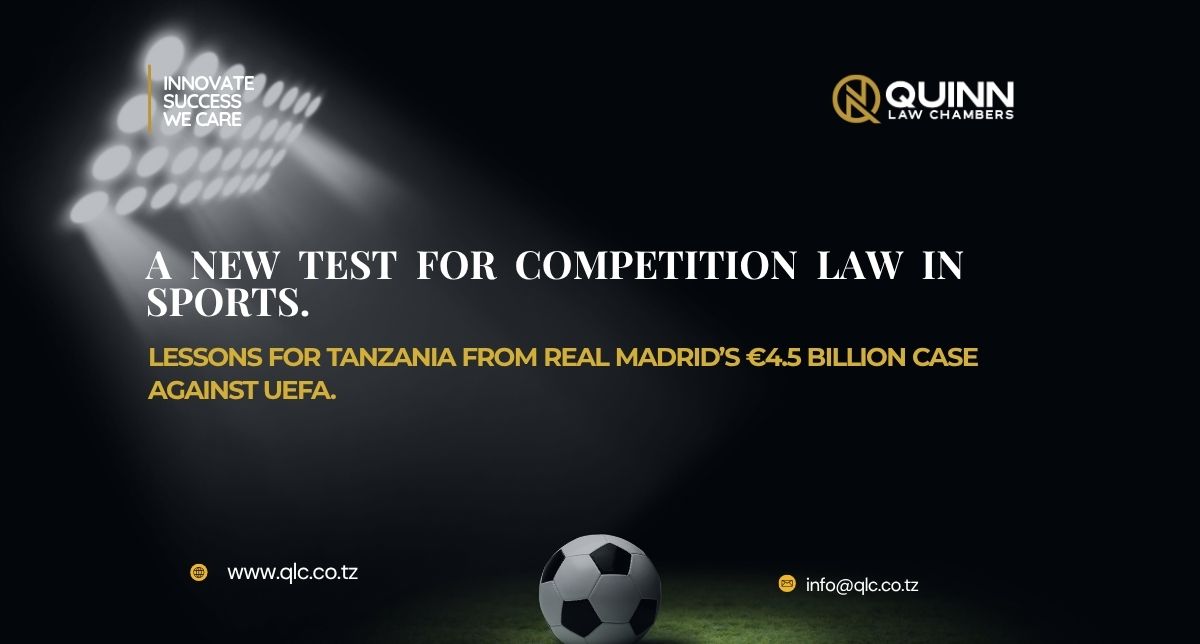
A New Test For Competition Law In Sports: Lessons For Tanzania From Real Madrid’s €4.5 Billion Case Against Uefa
The sporting world is watching closely as Real Madrid and A22 Sports Management pursue a landmark €4.5 billion lawsuit against UEFA, accusing football’s governing body of abusing its dominant position by blocking the creation of the European Super League. While this may seem like a dispute between football giants, it represents a broader legal turning point one that could redefine how competition law applies to sport and offer valuable lessons for Tanzania’s growing sports industry, where governance and commerce are increasingly intertwined.
1. Power, Monopoly, and Market Control
At the heart of the case lies a critical question: can a regulator also act as a competitor? UEFA both governs European football and profits from major tournaments such as the Champions League. Real Madrid argues that this dual role violates Article 102 of the Treaty on the Functioning of the European Union (TFEU), which prohibits the abuse of a dominant market position. By threatening sanctions against clubs and players who joined the Super League, UEFA allegedly used its authority to protect its own commercial interests, limiting innovation and fair market access the very principles competition law seeks to defend.
2. The Global Legal Implications
The outcome of this lawsuit will likely set a global precedent. If Real Madrid succeeds, sports federations across the world including in Africa may be required to separate their regulatory powers from their business operations to preserve market fairness. Such a ruling would not only affect UEFA but could also influence organizations such as FIFA, the International Olympic Committee (IOC), and regional sports bodies that combine rule making with profit-generating activities.
3. Lessons for Tanzania’s Sports Industry
Tanzania’s sports landscape faces similar structural realities. Many federations act as both regulators and commercial participants, managing licensing, events, and sponsorships while also controlling who can enter or benefit from the market. As Tanzania’s creative and sports sectors expand, this overlap could raise concerns under the Fair Competition Act, Cap. 285, which prohibits monopolistic or restrictive practices.
Adopting lessons from the Real Madrid case could help Tanzania strengthen its governance structures by:
Ensuring transparency and fair access for clubs, leagues, and private investors.
Encouraging independent oversight in decision-making within federations.
Attracting foreign investment through clearer, predictable legal frameworks.
Promoting ethical standards and accountability in sports administration.
4. The Broader Message for Policy and Law
Real Madrid’s lawsuit highlights how law now plays a central role in the business of sport. It underscores the need for legal systems to adapt as sports evolve into billion-dollar industries driven by intellectual property, digital media, and brand power. For Tanzania, this is a timely opportunity to align its sports governance with international best practices embedding competition law principles into national policy, promoting transparency, and building investor confidence across the creative economy.
Ultimately, this case reminds us that law remains the great equalizer. Whether in Europe or Africa, the rule of law ensures that even the most powerful institutions remain accountable to principles of fairness, openness, and integrity.
Why This Case Matters for Tanzania
Governance Reform: Separating regulatory and commercial functions strengthens institutional credibility.
Investor Confidence: Transparent frameworks attract partnerships and sponsorships.
Fair Competition: Clubs and investors gain equitable market access.
Modernization: Integrating competition principles prepares Tanzania’s sports law for future global collaboration.
For Tanzania, the lesson lies not just in legal reform but in foresight building systems where regulation serves progress, not protectionism. As the nation’s sports and creative industries mature, adopting principles of fair competition will ensure growth that is not only profitable but principled.


